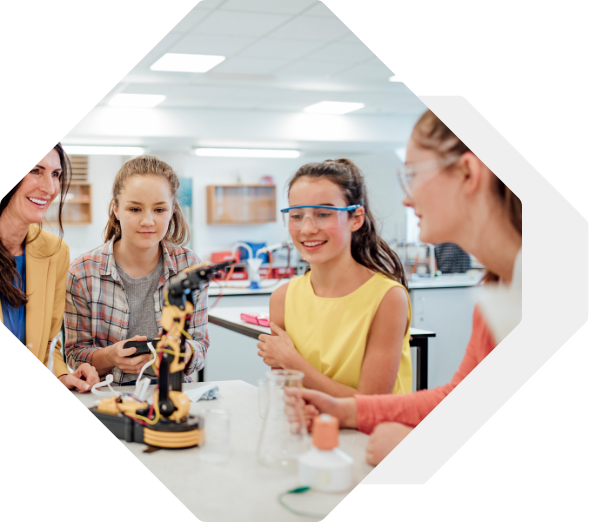Why Choose KTEC?

Innovation
- Ever evolving to meet the needs of our industry and educational partners
- Breaking the stereotypes of industry and celebrating the dignity of work
Industry Driven
- Earn industry credentials
- Industry competency-based standards
- Simulated workplace
- Focus on Professionalism and 21st Century Skills
Technical Foundation
- EVERY student will take introductory technical classes
- Hands-on learning of industry skills
- Exposure to options within Technical Career Paths
Career Readiness Skills
In addition to the technical skills learned at KTEC, the development of career readiness skills is equally important. All students at KTEC High School are expected to learn the following traits and skills:
Academic and technical skills are integrated across multi-disciplinary projects. Students will apply their skills to accomplish workplace tasks.
Students will effectively express ideas, inform others, share knowledge, and provide customer service.
Students will understand how they play a role in the success of their employer and community through personal, civic, and community actions.
By recognizing and solving problems – from small technical issues, to group dynamics, to the design of overall systems – students will persevere to solve real-world problems.
Students will develop the ability to intelligently reason through and make complex decisions.
Students will generate and share innovative and new ideas.
Leadership skills will be developed by students through real-world opportunities to ethically lead and manage.
Students will collaborate with colleagues representing various backgrounds.
Students understand how to use technology and apply it successfully in the workplace.
Students will learn to manage a personal career including understanding and meeting the expectations for professionalism and skills in the workplace.
Students will recognize the benefits of physical, mental, social, and financial well-being.

Student Experience
What students at KTEC High School Can Expect
While every high school senior will have access to the required and recommended courses for post-secondary advancement, the proposed program’s uniqueness lies in the comprehensive technical education provided to all students. At KTEC, students will complete sixteen industry certifications through technical skills courses. Upon selecting one of our four Technical Career Paths, students will have the opportunity to pursue more specialized certifications. Additionally, students can earn additional certifications by taking courses outside their chosen path. All earned certifications and corresponding competencies will be compiled into a portfolio, which students can utilize throughout their high school years and professional career.
In addition to the broad spectrum of technical education courses and certifications that all students will participate in, eleventh and twelfth graders will also engage in a simulated workplace experience in one of four areas: Transportation, Information Systems, Building Trades, or Advanced Manufacturing/Industrial Maintenance.
The demand for a skilled workforce in Kenosha and Southeast Wisconsin continues to grow. Through our simulated workplace initiative, students will be immersed in a workplace environment that offers rigorous training and support, enabling them to develop the necessary skill set to become work-ready employees. Simulated workplaces transform classrooms into company settings, introducing students to real business processes. This initiative works closely with business and industry experts to ensure that the curriculum and projects meet the needs of tomorrow’s workforce.
Within a simulated workplace, classrooms operate with student-led instruction, with students and instructors sharing the focus. They collaborate to create a culture that emphasizes each student’s interests, capabilities, and learning styles. By integrating these authentic business practices, every student in the school gains access to the essential skill sets and academics required to be prepared for college and careers.
Simulated workplaces encourage local business and industry experts to join onsite review teams, assisting us in ensuring that students meet the needs and expectations of the workforce. These business partners also support job fairs, where juniors can seek internships or part-time employment, and seniors can find full-time opportunities.
Simulated workplaces have been successfully implemented in career and technical education classrooms in other states such as West Virginia and Alabama. For more information about simulated workplaces, please visit https://wvde.us/simulated-workplace/.
KTEC students will participate in a career fair at the end of their junior and senior years. Unlike typical career fairs where employers have booths to showcase their companies, students will have the opportunity to demonstrate their skills and capabilities to employers. KTEC students will present portfolios containing their certifications, competencies, written works, and project samples. Each student will provide resumes and cover letters that highlight relevant academic and work experience for employers to review. Additionally, students will showcase any applicable work-related projects. The career fair will enable students to network with potential employers and explore internships or part-time work opportunities during their senior year.
As part of their senior year requirements, KTEC students will complete a capstone project in their chosen Technical Career Path. The capstone project will be self-paced and completed independently. Technical Career Mentors will oversee and approve students’ progress and completion of their projects. These projects will address current industry trends, provide solutions to industry problems, and/or develop inventions to meet industry needs. The capstone project aims to integrate students’ soft skills, academic knowledge, and industry experience.
KTEC students will have the opportunity to participate in a business shadowing program connected to their chosen Technical Career Path. Through this program, students will spend one to three days at a business, aiming to gain a deeper understanding of their field of interest and the skills required for success in that field. The shadowing program provides valuable real-world work experience and insights as students explore career options within their chosen Technical Career Path.
Internship opportunities may also be available through partnerships with businesses, depending on their current needs. Senior KTEC students will have the chance to complete internships during or after the school day, based on the credits they have earned leading up to their final year. Internships offer students the opportunity to gain in-depth work experience prior to entering the workforce.
Frequently Asked Questions
The Office of Educational Opportunity (OEO) exists to incubate educational innovations, to improve known best practices, and to increase educational equity.
LEGISLATIVE BACKGROUND
The Office of Educational Opportunity (OEO) was created through the Wisconsin Legislature in 2015 as part of the biannual budget Act 55 and amended in 2017 to allow for statewide chartering. Statutes 36.54, and 118.40(2x) define OEO’s scope and authority. The OEO director is appointed by the UW System president.
VISION: THE WISCONSIN IDEA IN ACTION
As part of the University of Wisconsin System, OEO lives the Wisconsin Idea by incubating new educational opportunities, sharing what we learn along the way with
PK-20 stakeholders, and supporting efforts to close opportunity gaps and eliminate achievement gaps.
CORE VALUES
Innovation, Incubation, Equity, Collaboration, Integrity
Independent charter schools, sometimes referred to as 2r or 2x charter schools, are charter schools that are not authorized by a public school district. Each of the following have authority to authorize a charter school in Wisconsin:
- The common council of the city of Milwaukee
- The chancellor of any institution in the University of Wisconsin System
- Each technical college district board
- Waukesha County Executive
- College of Menominee Nation
- Lac Courte Oreilles Ojibwa College
- UW-System Office of Educational Opportunity
The terms “2r” or “2x” refer to the section of the charter school law within s. 118.40 that grants referred to as legacy or new independent charter schools. Legacy schools are schools chartered by authorizers who had the authority prior to 2015 Act 55 (UW-Milwaukee, the City of Milwaukee, UW-Parkside, and MATC), and new independent charter schools are those chartered by an authorizer who received authority to authorize in or after 2015 Act 55 (Waukesha County Executive, College of Menominee Nation, Lac Courte Oreilles Ojibwa College, Office of Educational Opportunity, any UW Chancellor (other than UW-Milwaukee and UW-Parkside), and any technical college district board (except MATC).
- Preparing teachers, school leaders, and specialized instructional support personnel, including through paying the costs associated with:
- providing professional development; and
- hiring and compensating, during the eligible applicant’s planning period specified in the application for subgrant funds that is required under this section, one or more of the following:
- Teachers.
- School leaders.
- Specialized instructional support personnel.
- Acquiring supplies, training, equipment (including technology), and educational materials (including developing and acquiring instructional materials).
- Carrying out necessary renovations to ensure that a new school building complies with applicable statutes and regulations, and minor facilities repairs (excluding construction).
- Providing one-time, startup costs associated with providing transportation to students to and from the charter school.
- Carrying out community engagement activities, which may include paying the cost of student and staff recruitment.
Any student in grade 9-12 who is a resident of Wisconsin may be a student at KTEC High.
Since KTEC High School is a separate school from the KTEC (4K-8), there must be a separate lottery. All interested students must apply during the enrollment period established by the KTEC High School Board annually. If more students apply than there are open spots, then a random lottery will be conducted.
Second, this model is unique because it is planned with industry and educational partners at the table from the beginning. The idea of this expansion came out of the needs for high-skilled entry level workers in Kenosha and across the country. All four career paths chosen are in high demand; therefore, there are more job opportunities available than skilled workers to fill them.
Students in the high school will earn certifications that align with competencies identified by industry in all technical classes. Students will be able to showcase these competencies in a portfolio and career fair.
While this model prepares students for postsecondary education, the focus is on students being workforce ready by integrating career readiness skills (such as creativity, communication, collaboration, and problem-solving) at the end of high school. Students will be able to prosper at jobs in high-demand, high-skilled positions.
Finally, this proposal and KTEC’s school is about returning our students back to understanding the dignity of work. If we want our economy to prosper and grow, we need individuals to pursue careers in the trades and other technical fields.
Students will continue to gain industry required skills and certifications as they complete these paths. Students also could take classes across other Technical Career Paths while still maintaining a chosen path. Technical courses will promote self-pacing when possible so that students can maximize their readiness for industry. Students will also gain valuable work experience through simulated workplace classrooms and the opportunity to participate in internships. Through our partnership with Gateway Technical College, students will have the opportunity to earn college credits in their field of study.
Students will have access to encore classes and extracurricular activities that prepare them for life after KTEC. The specific courses offered will be developed during the planning year and offered based on student interest. Extracurriculars will also be determined by student interest and advisors/ coach availability.
Governance Board
Industry partner / Mentor


